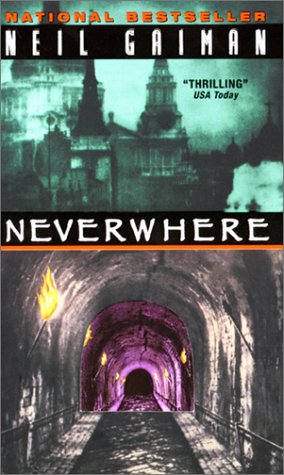

Neverwhere -- Neil Gaiman
reviewed by jim tschen-emmons 4.28.04
 If
you are a lover of myth, and if you believe that myth is not something only
associated with Homer, the Red Branch, or the fabulous western journeys of sage
monkeys, then Neil Gaiman is perhaps a name you know. Clearly I am not talking
about myth as too many people view it, that is as collections of “untruth,”
primitivism, or fiction, but as a professor of mine once put it—of memorable
truth, of stories that are a part of who we are, of the hereditary legacy of
the human condition. The tales of Neil Gaiman, like any good myth, resonate
with our core ideas, fears, and experiences, but they also fill in the gaps
our waking lives present to us every day. More so than his other tales, Neverwhere
brings the hardly noticed substrata of daily what-ifs into high relief.
If
you are a lover of myth, and if you believe that myth is not something only
associated with Homer, the Red Branch, or the fabulous western journeys of sage
monkeys, then Neil Gaiman is perhaps a name you know. Clearly I am not talking
about myth as too many people view it, that is as collections of “untruth,”
primitivism, or fiction, but as a professor of mine once put it—of memorable
truth, of stories that are a part of who we are, of the hereditary legacy of
the human condition. The tales of Neil Gaiman, like any good myth, resonate
with our core ideas, fears, and experiences, but they also fill in the gaps
our waking lives present to us every day. More so than his other tales, Neverwhere
brings the hardly noticed substrata of daily what-ifs into high relief.
I recently learned that Neverwhere began as a television program in Gaiman’s native England, only later becoming a book. I like the inversion. I think he probably does too. After all, Neverwhere is about inversion, that is, a world below our own and which we seem not to see mostly because we are not looking. The protagonist, Richard Mayhew, is a decent person, and like most decent people leads a life singularly unpunctuated by excitement or trouble. The night before he leaves for a new job in London, Richard meets a homeless woman outside a pub in his home in Scotland. She tells him his fortune and says “You got a long way to go....”
Not long afterwards, Richard and his fiancée, a woman interested in making something of Richard, encounter a wounded girl while walking at night. Against his fiancée’s wishes, Richard decides to help the girl and his life is never the same again. In assisting Door (the young woman’s name), Richard “falls through the cracks” into a world below London that gives new meaning to many of the subway stops of the Underground. His life above ground no longer exists as a result and Richard’s quest to regain his old life takes him deeper into his new world, one that is home to respectable rats, an angel, sewer denizens, and a host of characters, some pleasant, some unbelievably nasty.
The parallel story to Richard’s is that of Door. Predictably, their lives and stories intertwine. Gaiman’s treatment of these two stories, however, is excellent. Door’s pursuers add some spice to Richard’s bumblings in seeking his old life, and Richard’s good natured soul helps Door, and a few of her friends, in discovering who murdered her family, and, who poses a threat not only to her, but everyone.
While on this chthonic journey, Gaiman’s story telling, and his gift for character invention, do not disappoint. Though many of the people of Neverwhere are vaguely reminiscent of legendary people and creatures, they are distinct, different, highlighting the sense that one is traveling a world that is oddly familiar and yet totally foreign. Good guys and bad guys alike—and most people in this story fall somewhere between these two poles—are rarely flat. A few are the sort that, upon finishing the book, one will miss and which one wishes inhabited more stories.
In comparison to some of Gaiman’s other works, such as American Gods for example, this story might be called “Gaiman-light”—while fun, it is less complicated, less tightly woven than the tale of transplanted gods in the U.S. In part, I think this is owing to the nature of its origins; this is a story that went from script, to film, to book. This does not mean it is not enjoyable, only that the less mythically inclined can read it without a bevy of encyclopedias. Not that this is a bad thing. In my opinion, few good, complicated stories, such as Silverlock, lose anything for complexity (Eco’s Foucault’s Pendulum being a notable exception). One of the gifts of Gaiman is that his stories, characters, and even individual lines are food for your brain—looking them up is both enjoyable and educational, and when you don’t find them, respect for Gaiman’s creativity only grows. Neverwhere is humorous, exciting, odd, fun, and an ingenious look at the things we take for granted, the gap between the deck and the subway and even the real meaning of a subway stop’s name. Neverwhere is a book for any lover of myth and while not the feast, perhaps, that one enjoys with the Sandman stories or American Gods, it will make your brain fat, and, happy.